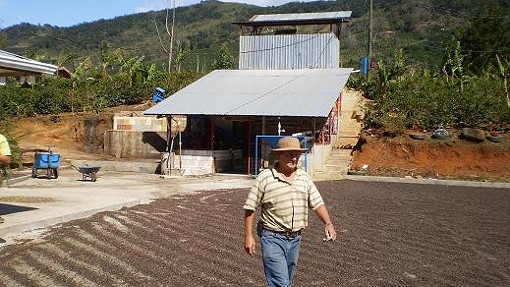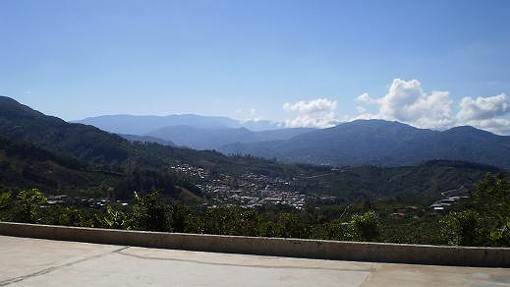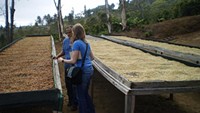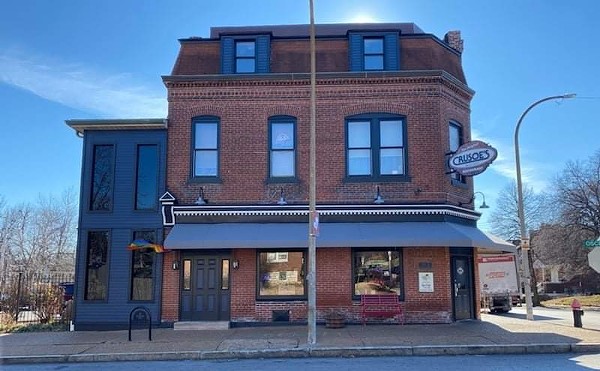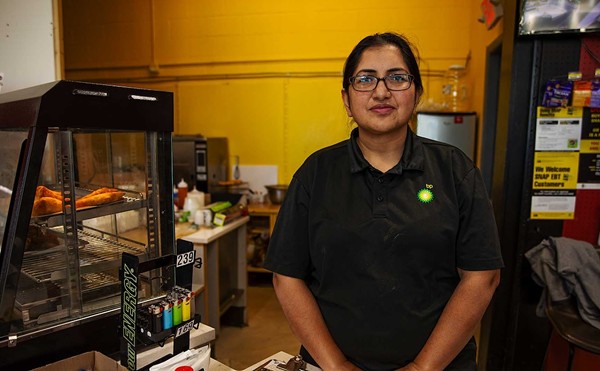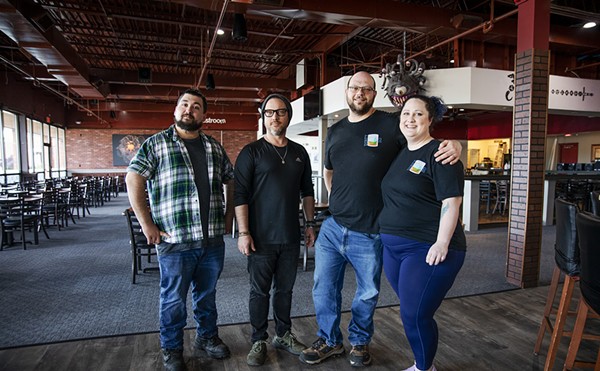Zach Dyer is a writer living in Saint Louis. He did his thesis research on coffee farmers in Southern Mexico. Since then, he has visited coffee plantations in Costa Rica and Mexico as well as roasters and cafés across the U.S. He blogs about coffee for Gut Check every Wednesday.
A vanguard of coffee growers in Costa Rica is leading the way for the next step in farmer empowerment. Tyler Zimmer, green coffee buyer for Kaldi's Coffee Roasting Company, recently gave a presentation at the company's St. Bernard roasting facility about his buying trip to Costa Rica and the rise of micro-mills. Tyler and I spoke last week about his trip and what these new organizations mean for farmers.
The year 2002 was an awful one for coffee growers. The C-price (the price at which coffee is traded on the New York Mercantile Exchange -- believe it: there's a coffee exchange) tanked, and farmers everywhere were loosing huge sums money on their crops. Small growers were especially hard-hit. Considering that approximately 70% of the world's coffee is grown by these small farmers, the impact from Central America to East Africa to Indonesia was substantial.
This crisis sent small, more vulnerable farmers looking for new markets such as Fair Trade. But a few farmers pooled their resources into the first micro-mills. Encouraged by the premium prices that large buyers like Starbucks paid these first micro-mills, farmers saw there was another path to sell their coffee.
Basically, a micro-mill is a group of farmers (or even just one farmer) that vertically controls the production process. By growing and processing their own coffee, these farmers can sell their crop in its finished "green" state and, pardon the pun, make some more "green" along the way.
"Thirty to 40 percent might be the average improvement" over conventional prices, Zimmer says. "It's all dependent on quality, though, so a farmer might double his profits on a great crop."
Traditionally, farmers sold coffee by the pound. They dropped off their coffee, weighed it and left with their earnings. This system that favored quantity over quality.
"You could have the best coffee in Costa Rica and never know it," Zimmer says.
Enter Exclusive Coffee Costa Rica. Based in San Jose, Costa Rica, Exclusive Coffee is largely responsible for the continuing education that has set these micro-mill coffees a shot above the rest. Exclusive Coffee works with farmers to set up a demanding three-tier quality system. The micro-mills that Zimmer visited in Costa Rica painstakingly separate any cherries that don't make their demanding standards. Coffee from each farmer's individual lot is separated to ensure precise traceability. Cupping samples of specific lots up to ten times before the coffee goes to market farmers learn what distinguishes their coffee and how to improve the notes buyers look for.
Zimmer's descriptions of the mills make them sound like eccentric DIY projects. The huge pulping and drying equipment might sit under a simple roof; the buildings teeter on the edges of steep hillsides; lumber for the buildings is from trees felled on the farmer's land. But the work involved in a micro-mill is not as romantic as their scenic settings might suggest.
Forget Wall Street's fallout on Main Street -- how about its impact on Tarrazú, Costa Rica's leading coffee region. The credit crisis has affected micro-mills' ability to get loans to re-invest in their business. Finding the money to purchase and maintain processing equipment is a huge hurdle for small farmers. They muster the capital for the loans any way they can -- often having to mortgage their land to pay for the equipment. The mills can cost between $15,000 and $100,000, depending on the size and scope of services offered.
A micro-mill may process anywhere from 80 to 1,000 150-pound bags a year, which is minuscule when compared to the output of a typical cooperative. But the name recognition that comes from consistently high-quality coffee commands a premium. "They'd rather sell less coffee at a better price" than compromise their name in the marketplace, explains Zimmer.
"I'd rather buy my coffee from these guys where the quality is there and it's similar in cost to Fair Trade," Zimmer says. He noted that the fair trade system was fine but that developments like micro-mills are more sustainable in the long run. Not only are farmers learning more about how to improve their crop, they're taking ownership of the production process as well.
As the coffee market becomes more sophisticated and drives the premium for quality higher, farmers need more and more education to reap the most benefits from their crop. But there has to be more than a "if you grow it, they will come" mentality to micro-mill coffee. The success of highly specialized coffee mills depends on a solid consumer base, too. "I think roasters are just as much, if not more, responsible for getting the education out there," Zimmer says.
Java Enabled: The Micro-Mill Revolution Is Anything But Small
[
{
"name": "GPT - Leaderboard - Inline - Content",
"component": "41932919",
"insertPoint": "5th",
"startingPoint": "3",
"requiredCountToDisplay": "3",
"maxInsertions": 100
}
]


